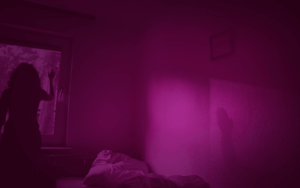Many people ask themselves why women in prostitution do not just leave if the situation is so terrible. “Why don’t the women just run away?” There are many reasons why women don’t (or can’t) leave prostitution.
Women forced into prostitution by human traffickers or pimps continuously find themselves locked up in apartments and unable to flee. They are always chaperoned so that they never travel alone. When with a client in a hotel, assistants in the network ensure that they are unable to escape afterwards. Some may attend certain appointments alone, such as to a nail salon, but the pimps regularly monitor their location via their telephone and apply psychological pressure by regularly calling them.
Leaving the world of prostitution requires a financial footing. Apartment rent and sustenance are required temporarily without having any work lined up.
Since most people working in prostitution come from abroad, they do not receive income support for basic supplies and do not apply for unemployment benefits as they acted on a self-employed as a prostitute in Germany.
In reality, these women face a daily financial battle in order to survive: they must settle their debts with pimps and the room rent must be paid daily. Both of these costs alone eliminate the majority of income. The little that remains is used for personal expenses or to provide for their family. No money can be saved. A financial buffer is required however to pay the deposit for a private apartment, for example.
Many women do not have their own apartment and live with their pimps or in a room at the brothel. The woman often lives in the same place she works, meaning that there is no differentiation. Not only do they need their own accommodation to escape but also protection from pimps. The women need physical distance for their safety. The entire network of personal relationships is often based in the red-light district, leaving few contacts outside this situation.
Many women in the red-light district are unaware of their rights and are unsure whether they are living in Germany legally. Some of them have their passport taken from them. They are afraid of the legal consequences. The legal situation plays a major role for women of African origin in particular as they are often unable to remain in Germany and their request for asylum is rejected. They fear being returned to their homeland and therefore remain in the illegal underground.
Most women working in prostitution speak very little German. They may have only attended a couple of years of school in their home countries. Some are even illiterate. For them, escaping is a major challenge as they first need to attend language courses and receive an education to find other work. They do not earn any money during this time. Only few have a legal right to financial support services during these times. If they do manage to find new work, many find it difficult to communicate or understand the job requirements.
Some women are regularly moved to new locations by their human traffickers or pimps. Some change towns every week. This leads to a severe lack of support and orientation. Support structures in the town are unknown and they sometimes do not even know which town they are currently working in.
For many women, the red-light district is considered its own world. They even talk of the red-light district and the other world outside of it. Those having to spend all day in a brothel lose contact with people on the outside. This is either because the pimps have forced them to isolate or because both worlds have combined into one. Any remaining relations with other people are therefore within the same system. They lack friends on the outside who can give them the courage to escape or help them build a new life.
You don’t pay regular taxes, you don’t pay for health insurance, you are not registered anywhere, you have no postal address and you have nothing at all anymore. You don’t exist in the eyes of the German State despite living and working in Germany.
It’s simply impossible when you have no accommodation and are in the midst of the red-light district. Anyone renting accommodation requires proof of an employment contract and payslips, which you don’t get working in the red-light district.
Even if you want to sign an employment contract somewhere, you need a registered address. You don’t have this as a women in prostitution. So you can’t get accommodation because you don’t have an employment contract but you can’t get an employment contract because you don’t have any accommodation. It’s a vicious circle and the German State simply chooses to look the other way.
They think that prostitution is a completely normal job and that the women do well in it. But women never do well in prostitution. The only ones who benefit from prostitution are the landlords and that’s it. And, perhaps also the State, as they collect taxes from it.– Former German forced prostitute
Pimps use threats and violence as a form of intimidation. The violence is either directed at the women themselves or at those important to them. They stay put for fear of the consequences should they try to flee. They settle for self-exploitation to prevent others from violence or exploitation.
Drugs and alcohol are part of everyday life in the red-light district. Some clients want to take drugs together with the women as part of their booked time slot. For some women, drugs and alcohol are the only way to block their inner pain.
According to the Federal Ministry for Family Affairs, 88% of prostitutes take substances such as painkillers, psychotropics and drugs. Those with a dependency first need withdrawal before they can escape, and many fail to manage this. Some don’t want to get off drugs because the internal pain is even more intolerable than the burden of prostitution.
Anyone exposed to the toxic manipulation of a loverboy over a long period of time begins to think and act differently. Their own wishes or needs gradually start to disappear. Thoughts about their own future begin to fade. Those affected lose their sense of self and tend to live in a mode of basic functioning.
Everyday prostitution life is full of violence: Urinating/defecating on women, verbal humiliation and gagging, penetrating all orifices and much more – this happens every day in the red-light district. The body regularly has to endure situations at the demand of the paying client, against its own wishes.
Enduring this requires the ability to separate the body from personal feelings and withdraw internally. This process is known as disassociation and is a survival mechanism for traumatising situations in which fight or flight is impossible.
Studies by Melissa Farley show that the violence experienced severely harms the brain and causes post-traumatic stress disorder. Panic attacks, nightmares, insomnia, disassociation, depression, self-harm, high stress levels: the majority of people involved in prostitution are faced with all this.
With this level of stress, the individuals find themselves in constant survival mode. In this mode, the brain has no capacity to think about the long-term future and focusses solely on daily survival.
If women in prostitution were exposed to sexual abuse as children (this amounts to 43% according to the Federal Ministry of Family Affairs), this affects their perception of self.
Long-term consequences affect their feeling of self-worth. Those who consider themselves worthless and tainted think less about the other options in their life. Self-exploitation therefore makes sense to them as their identity is characterised and damaged through the abuse. Some even have such a low sense of self-worth from the abuse that they think it is the only thing they deserve.
As an organisation, we know that escaping the exploitative prostitution system is almost impossible alone. It requires support structures to deal with both the external and internal factors at play.
This is where our MISSION FREEDOM HOMES come in. We want to provide services to help women escape and being their own healing process. More on this in the section “What we do”
I locked myself away for four months. I never even took a step out of the front door [Comment: after arrival at the shelter]. I was paranoid. Yes, I felt panicky. I started wetting the bed when I got out. I regularly peed the bed because I was feeling such panic and having nightmares at night.
And that’s it – I told my psychologist about it, I talked with her about why I was wetting the bed at an age when it’s really embarrassing and so on. But she just said that it’s the body’s way of protecting itself. It happens when the body doesn’t know what it should do any more.
Mentally, I was at the end of what I could bear. When I left the red-light district I barely weighed 49 kilos. I was pretty much emaciated. I could have died since I was so haggard, even though I was eating three meals a day in the red-light district. But the stress ate away at me so much that my body had burned all of its energy reserves and I was nothing but skin and bones. I’m still dealing with it to this day.– Former German forced prostitute





